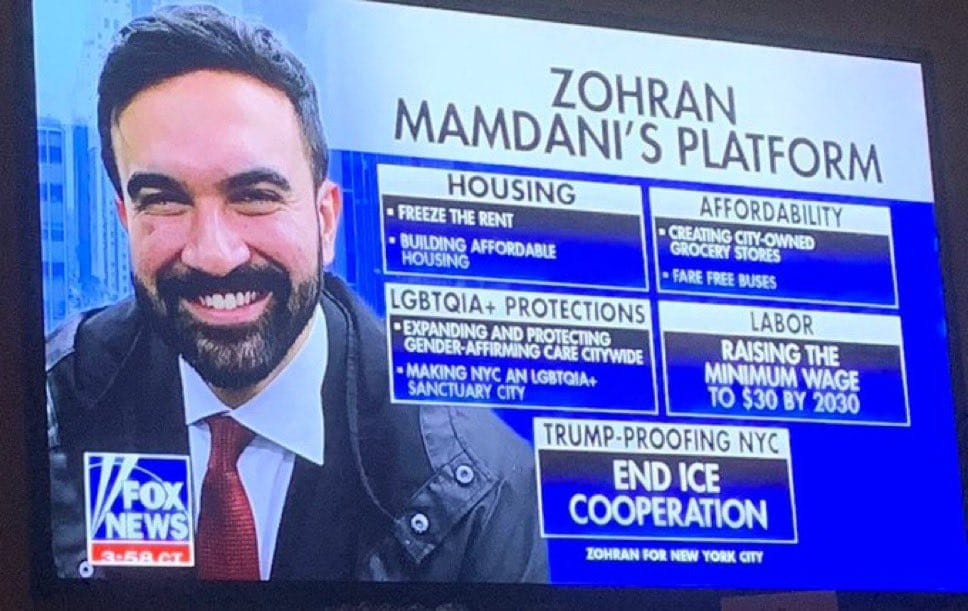MAGA Plans Fake Emergency To Rig Midterm Elections
Donald Trump’s MAGA movement can’t win the midterm elections—so now they’re plotting to steal them. The

Free childcare and buses. Cheaper groceries. Lower rents.
Whether or not you support Zohran Mamdani, who won the Democratic primary for mayor of New York City, you have to admit: He stands for something.
But wait: Isn’t this a list of policies, and don't policy list generally fail to win campaigns? Yes, but these policies were part of Mamdani’s overall framing of government as an empathetic and nurturant force with a responsibility to care for people.
“This campaign is for every person who believes in the dignity of their neighbors and that the government's job is to actually make our lives better,” said Mamdani in announcing his campaign, which focused entirely on making New York City safer and more affordable.
And he focused on families, pledging to help families with the cost of childcare:
After rent, the biggest cost for New York’s working families is childcare. It’s literally driving them out of the city: New Yorkers with children under six are leaving at double the rate of all others. The burden falls heaviest on mothers, who are giving up paying jobs to do unpaid childcare.
Zohran will implement free childcare for every New Yorker aged 6 weeks to 5 years, ensuring high quality programming for all families.
Mamdani has other important qualities that make him a powerful candidate—authenticity, charisma, and energy. Those are important because politics doesn’t run on magic words or messages. Winning also requires talented leaders with the power to inspire.
But Mamdani’s main selling point is that he gave New Yorkers a positive vision of a future in which their government cares for them and seeks to directly improve their lives. “Vote for you,” he told New Yorkers—a simple message that framed the entire campaign around the common good.
That vision has created a tremendous amount of enthusiasm from his supporters—and vicious attacks from his opponents. Mamdani’s detractors mocked his promises and repeated them constantly: Free buses! No-cost childcare! Lower rents!

Well, guess what? These ideas sound pretty good to a lot of people. Mamdani successfully framed the campaign and forced his opponents to attack his ideas non-stop. But by doing so, they helped to strengthen his campaign.
The lesson for Democrats: It’s important to run for something, not just against something. And it’s crucial to put forth a positive vision that emphasizes government as a force that serves the public good. When you give people a concrete vision of how government can improve their daily lives, you create a frame that opponents can only attack by sounding like they're against helping families.
Mamdani didn't just offer policies. He offered hope and vision wrapped in specifics. His campaign showed that when progressives run for something transformative rather than merely against something terrible, they don't just win arguments. They win hearts, minds, and elections. (Another New York politician, Franklin D. Roosevelt, did this very successfully with the New Deal.)
A recent economic analysis found that 60% of Americans can't afford the basic necessities to achieve a "minimal quality of life." In a country where most people are struggling, Mamdani's approach isn't radical—it's common sense. Many of his ideas will be hard to achieve in reality, but his willingness to put forth a vision matters a lot.
Democrats everywhere should learn from this strategy: Offer voters a bold yet concrete vision that frames government as a caring and empathetic force that makes their lives better. Then let opponents explain why families don't deserve childcare, food, housing, healthcare, and transportation.
But remember: Mamdani hasn't won the election yet. He still has to get through incumbent Mayor Eric Adams, who will use fear to sow doubts about Mamdani and his plans. Adams will portray Mamdani as a threat to New Yorkers' deepest moral values — and to the safety of their families.
That's why it's important to frame ideas and policies explicitly in terms of core values, which tend to override self-interest and rational policy. For example, affordability is a freedom issue, because you're not truly free when you can't afford to live.
Subscribe